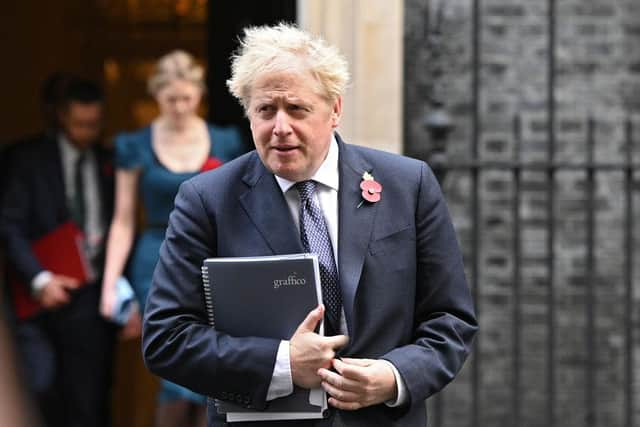How long do Covid antibodies last? Why Boris Johnson is self isolating again - and if you can get coronavirus more than once
Just months after contracting Covid-19, prime minister Boris Johnson is self-isolating after coming into contact with someone who has been infected by the virus.
Johnson, on the advice of the NHS Test and Trace team, has begun a 14-day isolation period but says he’s “bursting with antibodies” and “fit as a butcher’s dog” in a video posted on Twitter.
Advertisement
Hide AdAdvertisement
Hide AdBut it raises the question of how long antibodies against the coronavirus last - and if people can become reinfected over time?


Here’s all you need to know.
How do you know if you’ve had Covid-19?
It has been several months since the introduction of antibody tests to assess whether someone has had coronavirus.
The test is designed to see if someone has developed an immune response to Covid-19 by taking a blood sample and testing for the presence of antibodies.
The prime minister heralded the test which boasts a 100% accuracy rate, as a “game changer” in the UK’s fight against coronavirus.
It was hoped that the level of antibodies used to fight off infection would remain high and in time the UK would build up a level of herd immunity to suppress the outbreak.
Yet there have been reports of reinfiction in recent months, leading to the question of how long these Covid antibodies stay in our blood streams.
How long do Covid antibodies last?
Results from a recent study of healthcare workers show coronavirus antibodies last at least six months and offer protection against a second infection.
The study involved more than 12,000 staff at Oxford University Hospitals - of which 11,000 tested negative for Covid antibodies.
Advertisement
Hide AdAdvertisement
Hide AdAll staff were regularly tested for Covid-19 infections and for antibodies revealing a past infection.
The study found that the more antibodies people had, the lower their chances of reinfection.
Has the thinking on this changed?
Due to the newness of the virus, various studies are ongoing to help us further understand coronavirus.
A study produced by Imperial College London found the level of antibodies fell over time after coronavirus infection, meaning reinfection was a possibility.
Their work involved more than 365,000 randomly selected adults who went through three rounds of testing, and carried out over a three-month period this summer.
The proportion of people who tested positive for Covid antibodies declined by 26.5% over this period - suggesting antibodies reduce in the weeks and months after infection.
Yet there remains the chance a vaccine could stimulate longer-lasting protection, said professor Wendy Barclay from Imperial.
“I think that we can still continue to be optimistic about vaccines because vaccines will work in a different way,” she told Times Radio.
Advertisement
Hide AdAdvertisement
Hide Ad“What we’re measuring at the moment is the way that our bodies’ immune response reacts to the virus infecting us.”
What should I do if I come into contact with someone who has Covid again?
People who have previously been infected with coronavirus and produced antibodies to indicate an immune response still need to adhere to the same rules and guidelines as everyone else.
The same advice around washing your hands, wearing a mask and maintaining social distancing measures still applies.
And if you come in contact with someone who has the virus then you must self-isolate, following the instructions given by NHS Test and Trace.
What is herd immunity?
Herd immunity is seen as a way to control the virus outbreak.
It occurs when a high percentage of the population build up an immune response to the virus, limiting the number of people who can become infected.
By reducing the number of infections it reduces the virus’ circulation in society, helping to protect those most at risk of infection.
Why is Boris Johnson self isolating?
Advertisement
Hide AdAdvertisement
Hide AdPM Johnson, who was admitted to hospital in April after becoming infected with Covid-19, is currently self-isolating after meeting Ashfield MP Lee Anderson on Thursday.
MP Anderson lost his sense of taste the day after their 35-minute meeting at Downing Street and later tested positive for the virus.
No.10 maintains social distancing measures were followed but factors including the length of the meeting meant Johnson needed to self-isolate as a precaution.
Bassetlaw MP Brendan Clarke-Smith, South Ribble MP Katherine Fletcher, Warrington South MP Andy Carter and Great Grimsby MP Lia Nici are also self-isolating.
What has Boris Johnson said about self isolating?
In a video posted on Twitter, Johnson said: “Hi folks, the good news is that NHS test and trace is working ever more efficiently, but the bad news is that they’ve pinged me and I’ve got to self-isolate because someone I was in contact with a few days ago has developed Covid.
“It doesn’t matter that we were all doing social distancing, it doesn’t matter that I’m fit as a butcher’s dog, feel great – so many people do in my circumstances.
“And actually it doesn’t matter that I’ve had the disease and I’m bursting with antibodies. We’ve got to interrupt the spread of the disease and one of the ways we can do that now is by self-isolating for 14 days when contacted by test and trace.”
